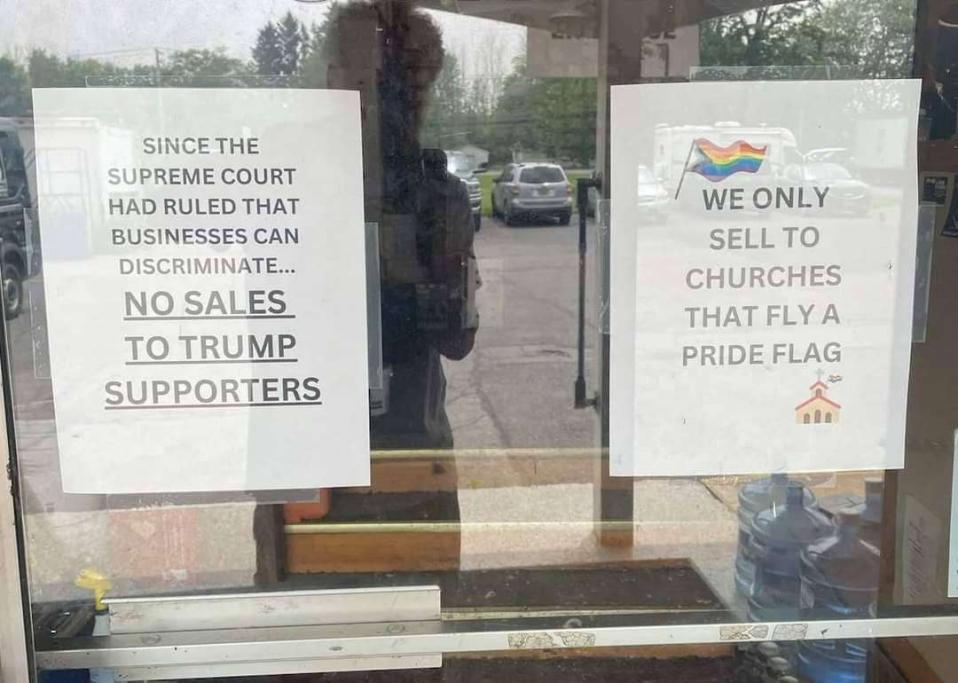Malicious Compliance
People conforming to the letter, but not the spirit, of a request. For now, this includes text posts, images, videos and links. Please ensure that the “malicious compliance” aspect is apparent - if you’re making a text post, be sure to explain this part; if it’s an image/video/link, use the “Body” field to elaborate.
======
-
We ENCOURAGE posts about events that happened to you, or someone you know.
-
We ACCEPT (for now) reposts of good malicious compliance stories (from other platforms) which did not happen to you or someone you knew. Please use a [REPOST] tag in such situations.
-
We DO NOT ALLOW fiction, or posts that break site-wide rules.
======
Also check out the following communities:
!fakehistoryporn@lemmy.world !unethicallifeprotips@lemmy.world
view the rest of the comments

I am not a lawyer.
These signs are surely in response to the recent US Supreme Court ruling which allowed a website designer to refuse to make websites for same-sex weddings.
First, churches are religious; Trump supporters are political, and not religious. In the US, religion is a "protected class", but political alignment is not. But traditionally, political alignment or part affiliation is not discriminated against, even if it is federall legal to do so. (Various states may have their own clauses making political alignment a protected class in certain contexts, I'm not sure.) Also important to this discussion is that sexual preference is not a protected class federally, although I know that many states have enshrined protection for sexual preference in their own state laws.
If a case were brought about discrimination against Trump supporters because of these signs, in a jurisdiction where politics was not a protected class, I should expect that that case would fail, under current law. But just like SCOTUS is highly political right now, lower courts are, too, especially lower federal courts. It's anybody's guess as to whether a given judge would actually adhere to existing case law.
For the religious side of these signs, it gets interesting. As above, SCOTUS has ruled that a religious business owner can discriminate against customers based on the business owner's "religious disagreement" with a position held by the customer, presumably where that disagreement does not overlap with a protected class.
And there's the rub. Religion is a protected class, so it should be prohibited to discriminate against someone for their religious position. This, however, really tips the scales in favor of the religious: the religious business owner can discriminate on the basis of their own religious belief, but no one can discriminate against them because of that same religious belief. To me, this seems to tread very heavily on the Establishment Clause of the First Amendment of the US Constitution:
"Congress," in this context, has been interpreted by the courts to mean more generally "the government," at any level. The recent SCOTUS ruling gives a religious business owner the right to discriminate on the basis of their religion, but the right of other people to discriminate against that business owner on the exact same basis remains prohibited. Again, I am not a lawyer, but that seems to be clearly in opposition to the Establishment Clause.
All of this is interesting, but none of it is cause for concern.
What is cause for concern is the foundation of Obergefell, which made same sex marriage legal in all of the US. That basis is that the only difference between opposite sex and same sex marriages is the sex of one of the people in the couple. An argument I recall from the time was that prohibiting same sex marriage is unconstitutional, because to do so would be discriminating against someone on the basis of sex - which is a protected class. However, that does not appear to have been mentioned in the court's ruling.
No matter the reason, if it is unconstitutional to discriminate against same sex couples in the context of their getting married in the first place, it should stand to reason that it would be unconstitutional to discriminate against those same sex couples in any other context. Reason does not appear to be this court's strong suit; they have decided that the rights of religious people to discriminate on the basis of their personal and individual beliefs "trumps" (pun intended) the rights of people (religious or not) to not be discriminated against.
This is a "canary in a coal mine" to overturn all manner of previous courts' rulings: Obergefell (same sex marriage), Loving v Virginia (interracial marriage), Griswold (access to contraception), Lawrence v Texas (legalization of homosexuality), and certainly others.
Again, all of this seems to prioritize religion, which is in clear opposition of the Establishment Clause.